
John William Coltrane was an African-American jazz saxophonist, bandleader and composer. He is among the most influential and acclaimed figures in the history of jazz and 20th-century music.

Eli "Lucky" Thompson was an American jazz tenor and soprano saxophonist whose playing combined elements of swing and bebop. Although John Coltrane usually receives the most credit for bringing the soprano saxophone out of obsolescence in the early 1960s, Thompson embraced the instrument earlier than Coltrane.
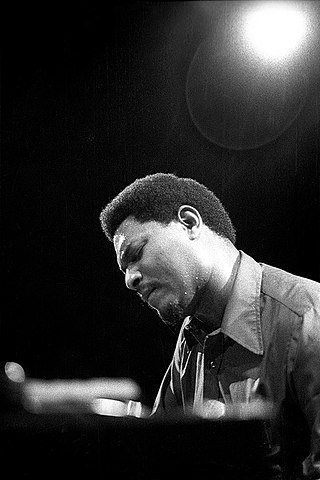
Alfred McCoy Tyner was an American jazz pianist and composer known for his work with the John Coltrane Quartet and his long solo career afterwards. He was an NEA Jazz Master and five-time Grammy award winner. Unlike many of the jazz keyboardists of his generation, Tyner very rarely incorporated electric keyboards or synthesizers into his work. Tyner has been widely imitated, and is one of the most recognizable and influential jazz pianists of all time.

Giant Steps is a studio album by jazz musician John Coltrane. It was released in February 1960 through Atlantic Records. This was Coltrane's first album as leader for the label, with which he had signed a new contract the previous year. The record is regarded as one of the most influential jazz albums of all time. Many of its tracks have become practice templates for jazz saxophonists. In 2004, it was one of fifty recordings chosen that year by the Library of Congress to be added to the National Recording Registry. It attained gold record status in 2018, having sold 500,000 copies.

'Round About Midnight is an album by jazz trumpeter Miles Davis that was originally released by Columbia Records in March 1957. It was Davis' first album with Columbia.
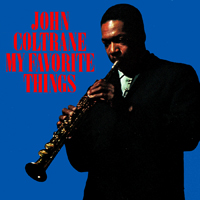
My Favorite Things is a studio album by jazz musician John Coltrane. It was released in March 1961 on Atlantic Records. It was the first album to feature Coltrane playing soprano saxophone. An edited version of the title track became a hit single that gained popularity in 1961 on radio. The record became a major commercial success.
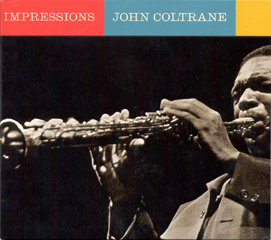
Impressions is an album of live and studio recordings by jazz musician and composer John Coltrane. It was released through Impulse! Records in July 1963.

Olé Coltrane is an album by jazz musician and composer John Coltrane. It was released in November 1961 through Atlantic Records. The album was recorded at A&R Studios in New York, and was the last of Coltrane's Atlantic albums to be made under his own supervision.

Miles Davis and Milt Jackson Quintet/Sextet, also known as Quintet/Sextet is a studio album by trumpeter Miles Davis and vibraphonist Milt Jackson released by Prestige Records in August 1956. It was recorded on August 5, 1955. Credited to "Miles Davis and Milt Jackson", this was an "all-star" session, and did not feature any of the members of Davis's working group of that time. Alto saxophonist Jackie McLean appears on his own compositions “Dr. Jackle” and “Minor Apprehension”.

Coltrane's Sound is an album credited to jazz musician John Coltrane, recorded in 1960 and released in 1964 on Atlantic Records, catalogue SD 1419. It was recorded at Atlantic Studios during the sessions for My Favorite Things, assembled after Coltrane had stopped recording for the label and was under contract to Impulse! Records. Like Prestige and Blue Note Records before them, as Coltrane's fame grew during the 1960s Atlantic used unissued recordings and released them without either Coltrane's input or approval.

Africa/Brass is a studio album by jazz musician John Coltrane. It was released on September 1, 1961 through Impulse! Records. The sixth release by the fledgling label and Coltrane's first for Impulse!, it features Coltrane's working quartet augmented by a larger ensemble to bring the total number of participating musicians to 21. Its big band sound, with the unusual instrumentation of French horns and euphonium, presented music very different from anything that had been associated with Coltrane to date. While critics originally gave it poor ratings, more recent jazz commentators have described it as "amazing" and as a "key work in understanding the path that John Coltrane's music took in its final phases."
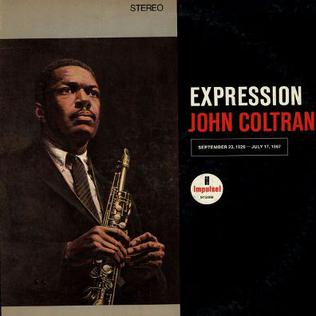
Expression is an album by jazz saxophonist John Coltrane, recorded in early 1967 and released in late September of that year, around Coltrane's birthday, and two months after his death. This was the first posthumous release of a Coltrane recording, and the last album he personally authorized.
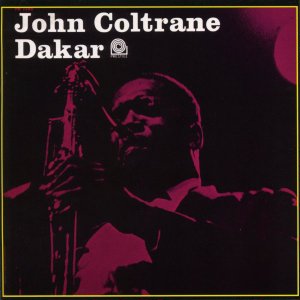
Dakar is a jazz album by saxophonist John Coltrane. It was released in 1963 on Prestige Records.

Coltrane is an album by American jazz musician John Coltrane which was released in October 1957 by Prestige Records. The recordings took place at the studio of Rudy Van Gelder in Hackensack, New Jersey, and document Coltrane's first session as a leader. It has been reissued at times under the title of The First Trane!.

Settin' the Pace is a studio album by jazz musician and composer John Coltrane. It was released in December 1961 through Prestige Records. It is assembled from previously unissued tracks from a recording session at the studio of Rudy Van Gelder in Hackensack, New Jersey in 1958. Coltrane on tenor saxophone is accompanied by Red Garland on piano, Paul Chambers on bass, and Art Taylor on drums. With Garland and Chambers, Coltrane had played together since at least October 1955 in Miles Davis' band. With Art Taylor they were part of the Tenor Conclave recordings in September 1956. As a quartet they had already recorded two albums for Prestige, John Coltrane with the Red Garland Trio and Soultrane. The material the quartet recorded on this session were extended interpretations of three popular songs and "Little Melonae", a classic bebop tune written by Jackie McLean. Of note is Coltrane's use of the sheets of sound technique, particularly on "Little Melonae".

Coltrane Jazz is a studio album by jazz musician John Coltrane. It was released in early 1961 on Atlantic Records. Most of the album features Coltrane playing with his former Miles Davis bandmates, pianist Wynton Kelly, bassist Paul Chambers and drummer Jimmy Cobb during two sessions in November and December, 1959. The exception is the track "Village Blues", which was recorded October 21, 1960. "Village Blues" comes from the first recording session featuring Coltrane playing with pianist McCoy Tyner and drummer Elvin Jones, who toured and recorded with Coltrane as part of his celebrated "classic quartet" from 1960 to 1965.

Coltrane "Live" at the Village Vanguard is a live album by jazz musician and composer John Coltrane. It was released in February 1962 through Impulse Records. It is the first album to feature the members of the classic quartet of Coltrane with McCoy Tyner, Jimmy Garrison, and Elvin Jones, as well as the first Coltrane live album to be issued. In contrast to his previous album for Impulse!, this one generated much turmoil among both critics and audience alike with its challenging music.

Trane's Blues is a compact disc credited to the jazz musician John Coltrane, released in 1999 on Blue Note Records, catalogue 98240. It comprises recordings from sessions for Blue Note and United Artists Records with Coltrane as a sideman for Paul Chambers, Sonny Clark, Johnny Griffin, and Cecil Taylor. These recordings were issued respectively on their Whims of Chambers, Sonny's Crib, A Blowin' Session, and Hard Driving Jazz albums. Two selections are from Coltrane's own 1957 Blue Train, and "One for Four" had been previously unissued. "Trane's Blues" had been issued on the compilation High Step in 1975, previously known as "John Paul Jones" and named after himself, the bass player Chambers, and the drummer Philly Joe Jones. Like Prestige Records before them, as Coltrane's fame grew long after he had stopped recording for the label, Blue Note used varied recordings, often those where Coltrane had been merely a sideman, and reissued them as a new album with Coltrane's name prominently displayed. In this case, the Big Four conglomerate EMI continued that earlier practice.

Coltrane for Lovers is a compilation album of recordings by American jazz saxophonist-composer John Coltrane, released posthumously on January 23, 2001, by Impulse! and Verve Records. The 11 tracks compiled for the album are all romantic ballads from Coltrane's early years with Impulse!, being recorded during December 1961 to April 1963 at engineer Rudy Van Gelder's recording studio in Englewood Cliffs, New Jersey. Dominated by Coltrane's classic quartet, the sessions also included collaborations with vocalist Johnny Hartman and pianist Duke Ellington.

Dear Old Stockholm is a compilation album by jazz musician John Coltrane released by GRP and Impulse! in 1993. The music, which was recorded on April 29, 1963 and May 26, 1965 at Van Gelder Studio in Englewood Cliffs, NJ, features Coltrane's quartet with Roy Haynes substituting for Elvin Jones on drums.




















